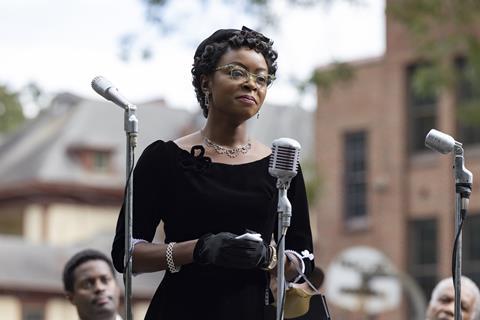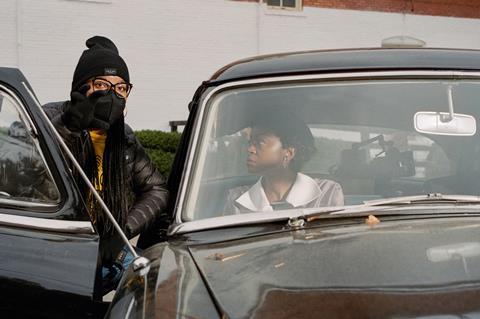After steady work on both stage and screen, Danielle Deadwyler has broken through with her Bafta- and SAG-nominated leading performance in historical drama Till. The actress talks to Screen about playing a civil-rights icon

This year’s Bafta nominees for leading actress include previous winners Cate Blanchett, Emma Thompson and Viola Davis, previous nominee Michelle Yeoh, and also Ana de Armas — a relative newcomer to the awards scene but a star whose profile benefits from appearances in the James Bond, Blade Runner and Knives Out franchises. Which makes fellow nominee Danielle Deadwyler — star of Nigerian-American director Chinonye Chukwu’s Till — the name that, for many, will be this awards season’s most notable acting discovery.
The nomination, the 40-year-old theatre-trained Georgia native says, is a “very cool” honour that made her “deeply appreciative”. It follows a SAG nod for leading actress as well as a win at the Gothams in the gender-neutral leading performance category (both for Till) and a nomination in this year’s Film Independent Spirit Awards for her supporting performance in post-apocalyptic TV miniseries Station Eleven.
Not that Deadwyler is letting the accolades turn her head. “I have been in the arts since I was a kid, so I’m very clear where I come from and how I have gotten to this place.”
The attention, she says, is all in the service of the “pivotal” woman she portrays in Till, Mamie Till-Mobley, a widowed mother who insisted the evidence of her son’s racially motivated murder be witnessed by the world. “The real deal is people are being educated and informed,” says the actress. “That’s the value of art and the beauty of Chinonye’s film.”
Till, which premiered at New York Film Festival in October, ahead of a North America theatrical release later that month via United Artists Releasing, dramatises the story of Emmett Till (played by Jalyn Hall), a Black teenager from Chicago who in 1955 was lynched for unwittingly causing offence to a white woman while visiting relatives in Mississippi. The narrative’s true driver is Mamie, whose decision to keep his coffin open and show mourners his horrific injuries gave the nascent US civil-rights movement one of its most galvanising images.
“I am from Atlanta, a central locale of the movement, and I know that people were impacted by what she did,” says Deadwyler. “Mamie didn’t want to be the only person talking about Emmett, and I think she would be pleased that’s not the case because this film exists.”
Starting conversations

Deadwyler was filming the Netflix series From Scratch when she heard about the project and put three scenes on tape for Chukwu and casting director Kim Coleman. For one of them, a tender duologue between Mamie and Emmett, she recruited her son Ezra Haslam, with whom she had acted in 2019 thriller The Devil To Pay. “He helped me with the scene where Mamie admonishes Emmett, while tying his tie,” she says. “He is a burgeoning little actor who offers his talents if he doesn’t have anything else to do.”
That her son, now aged 13, was impressed by the result clearly means a lot to Deadwyler. “The first time he saw it he said, ‘You did a good job, mom.’ The film merits conversations with your family and your children, so he has had to synthesise it in a lot of different ways.”
Till is a film full of acting challenges, from the howling despair gripping Mamie when her son’s coffin arrives from Mississippi, to her dumbstruck appraisal of his brutalised corpse on the mortuary lab.
Its dramatic setpiece, however, hangs on the testimony Mamie gives at his killers’ trial, which Chukwu (2019’s Clemency) opted to convey in a single, six-minute shot. “She had intended to do eight or nine set-ups, but after we did my coverage, she said, ‘This is it,’” remembers Deadwyler. “My background is in theatre, so I am firmly grounded in being able to sustain something for a consistent amount of time.
“A one-er enables you to live in the moment, so that’s what we did. I think we did six takes in all, and we all got to go home early that day.”
Emmett’s legacy demands a gravity on Deadwyler’s part that is reflected in the way she responds thoughtfully to Screen International’s questions. A full-throated laugh is never far away, however, not least when discussing an appearance on NBC’s The Tonight Show that saw her imitate Gollum from The Lord Of The Rings. “I love Andy Serkis,” she says about the man who played the role in Peter Jackson’s films. “It’s brilliant acting and he’s definitely someone who puts himself into it, body and all.”
Building a career
Deadwyler studied at Atlanta’s Spelman College, Columbia University in New York and Ashland University in Ohio, before embarking on a stage career back in Atlanta. An assortment of shorts and TV appearances followed, among them a role in Tyler Perry’s soap The Haves And The Have Nots and another in Paramount mystery series Paradise Lost.
Outside the US, audiences may have seen her first in Netflix revisionist western The Harder They Fall, playing a brass-knuckled saloon bouncer with a preference for masculine attire. It was, she says, “incredibly exciting” to play Cuffee in Jeymes Samuel’s “very Black” shoot-’em-up, for which she was nominated for the 2022 NAACP Image Award for outstanding supporting actress.
Deadwyler, whose surname is an Americanised derivation of the Swiss ‘Detweiler’, can be seen on Netflix again this year in Carry On, a plane-based action thriller from Jaume Collet-Serra (2009’s Orphan), which also stars Taron Egerton, Jason Bateman and Logan Marshall-Green.
There are other projects in the pipeline, but Deadwyler is taking her time. “People are sending stuff,” she says. “The question is when and how do you want to play? I’m at home replenishing and restoring myself at this point. I believe in slow work, whether that is performance art or experimental work or commercial film and TV. I want to continue to make and tell stories that are important for people to know about.”

























No comments yet